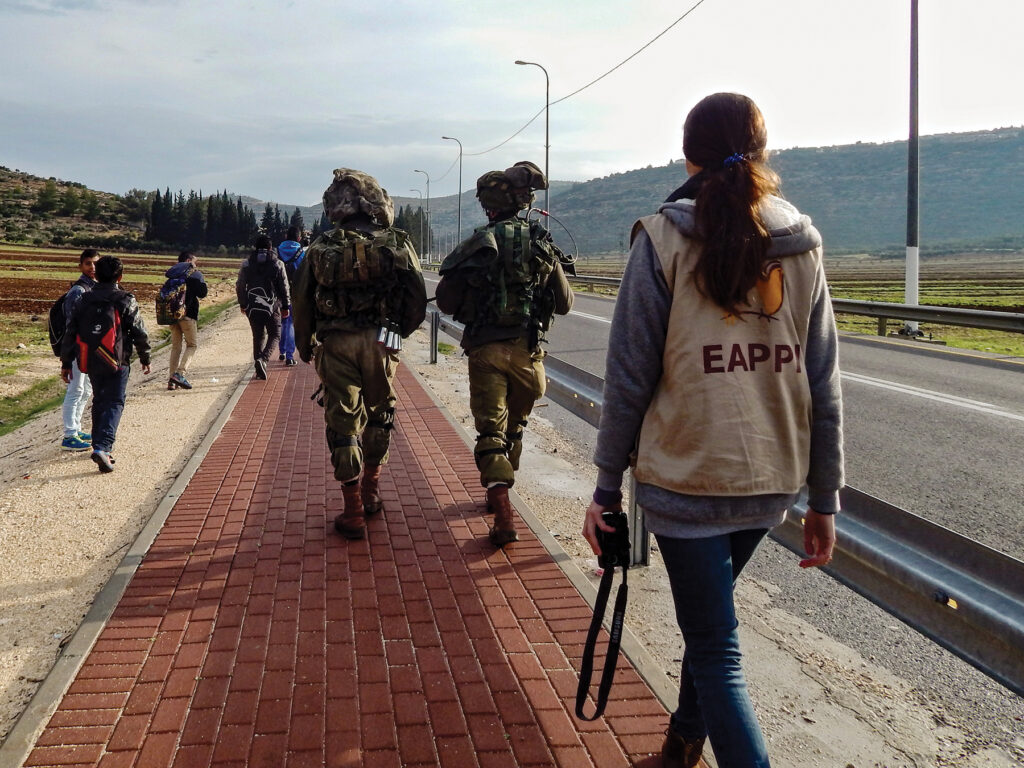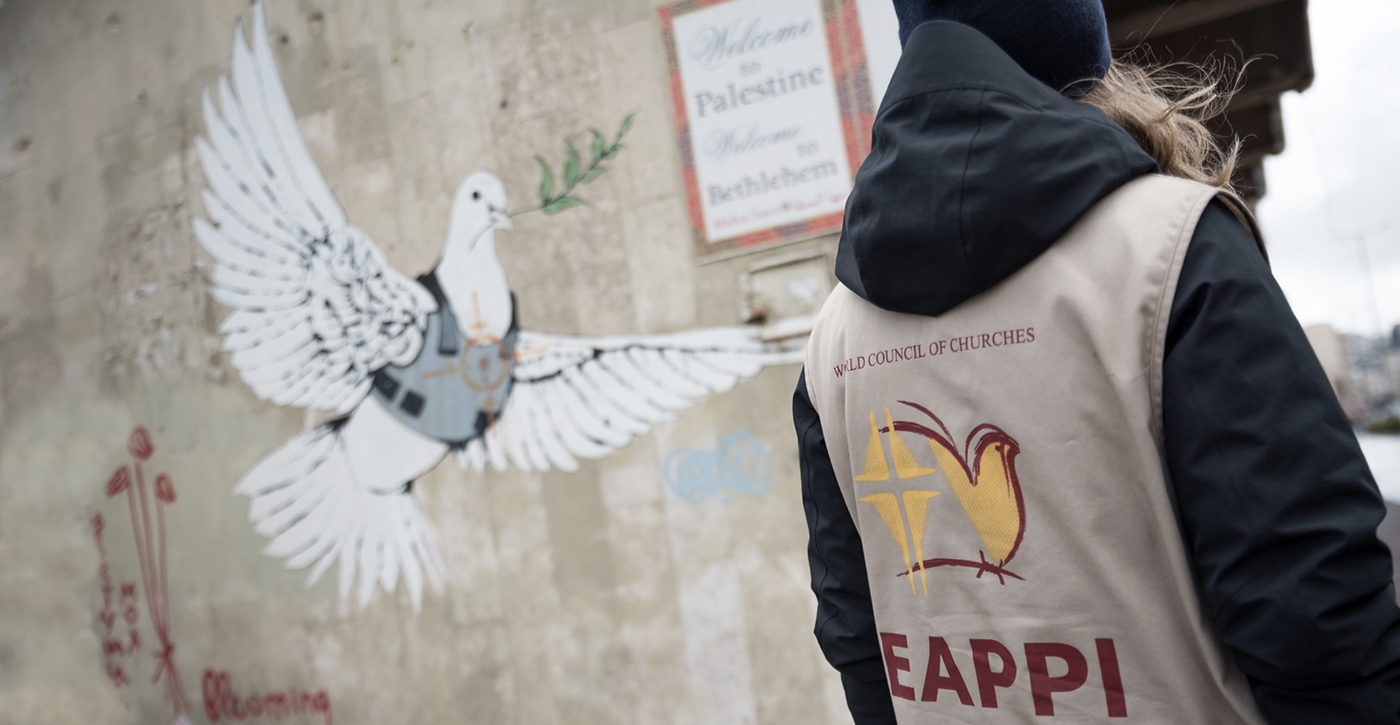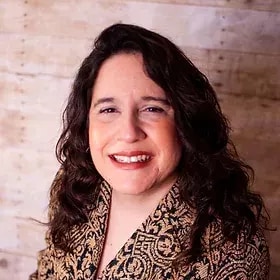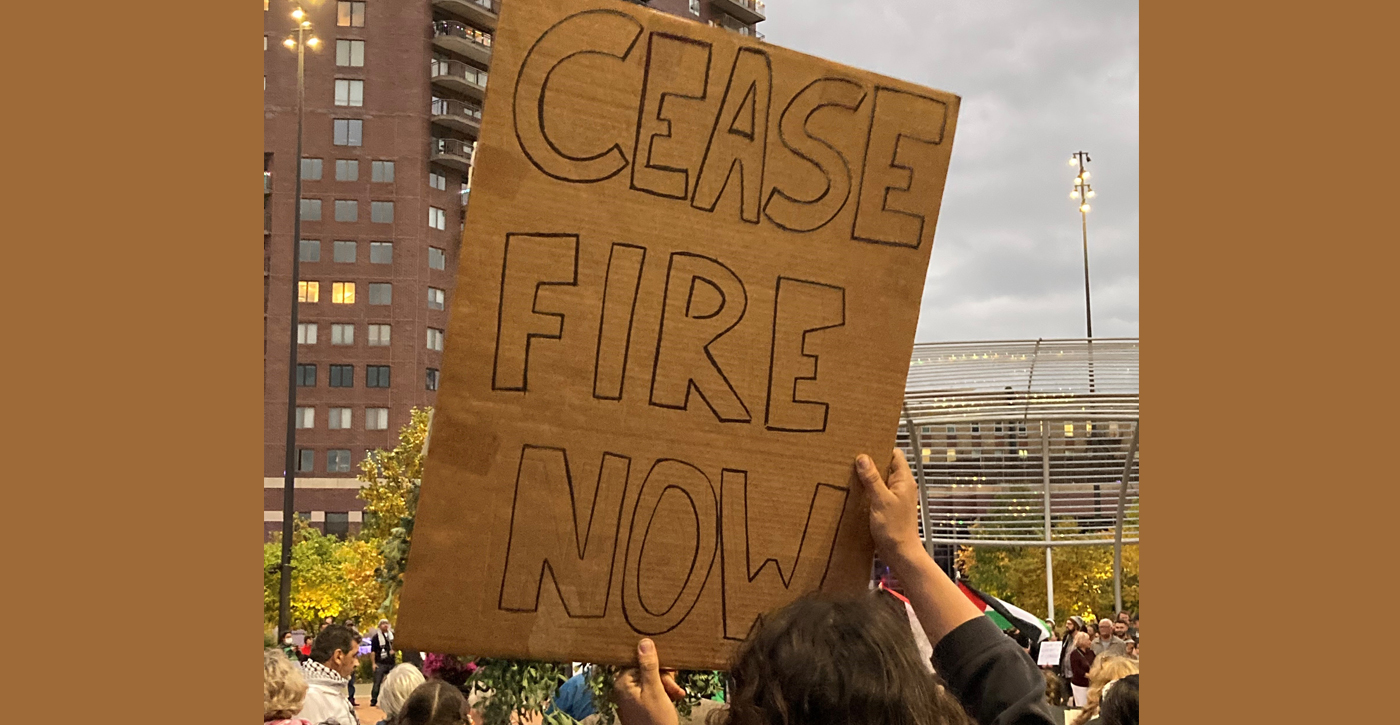A Friends Journal Report on the Work of Protective Accompaniers in Palestine
Through the World Council of Churches’ Ecumenical Accompaniment Programme in Palestine and Israel (EAPPI), Quakers join members of other faiths to provide a supportive presence at the request of Palestinian church members in the region. EAPPI sends 25 to 30 accompaniers at a time and has provided more than 2,000 volunteers since the program began in 2002, according to its website. Israeli peace activists also offer protective accompaniment. Friends Journal talked with three protective accompaniers about their inspiration and experience.
Ian Cave and Debby, who requested that we use only her first name, are British Quakers who volunteered with EAPPI from mid-January to mid-April 2023; both were based in the West Bank. Jewish Israeli activist Sahar Vardi, who lives in Jerusalem, currently works with the New Israel Fund and provides protective accompaniment to Palestinians. Vardi previously spent about ten years with American Friends Service Committee, coordinating its Israel program, until she left in 2021.
Debby contrasted her sense of security at home in Britain with the experience of sleeping in villages where residents feared being killed or displaced.
“You take it for granted that you put your head on the pillow and you feel safe,” said Debby, who is a member of Surrey and Hampshire Border Area Meeting in the United Kingdom.
Debby found it unsettling to accompany Palestinian children to school when they had to walk past two Israeli settlements where they feared attack by settlers. Soldiers from the Israel Defense Forces (IDF) walked behind the children to prevent the settlers from attacking them, according to Debby. The ecumenical accompaniers with EAPPI intended to make sure the military personnel showed up to escort the children.
The United Nations views accompaniers as the “eyes and ears” of the UN, explained Cave, because they are able to verify and report any human rights abuses they might witness in the ongoing Israeli military occupation of Palestine. During his time in the West Bank, Cave witnessed human rights violations by Israelis and also saw video footage of a Palestinian trying to stab an IDF soldier.
Vardi is an Israeli conscientious objector who is deeply involved in protective accompaniment for Palestinians. When COVID-19 restrictions froze international travel, more Israelis started providing a protective presence, according to Vardi. Israeli accompaniers persisted even since the October 7 attacks.
“Israelis were there on the ground and continued to provide protective presence,” Vardi said.
One person providing protective presence was killed since the October 7 Hamas attacks, according to Vardi. She added that violence by Israeli settlers increased significantly after the Hamas assaults. Israeli settlers displaced the residents of 16 Palestinian communities with which Vardi is familiar. In some cases protective presence did not prevent the displacement, and in other cases it helped stop the forced removal of Palestinians.
“That became one of the rare spaces where there was continued shared work of Israelis and Palestinians,” Vardi said.
Debby noted that an Israeli peace activist offered protective presence in the village where she was serving. Some Israelis with dual passports practiced protective accompaniment, capitalizing on their ability to talk with police and soldiers in Hebrew. Israelis regularly came across the border to protect Palestinian farmers trying to cultivate land, according to Debby.

In addition to accompanying Palestinians, ecumenical accompaniers connect with Israeli peace and human rights groups such as Rabbis for Human Rights, B’Tselem, and Women in Black, according to Quakers in Britain, the group that runs the UK and Ireland part of EAPPI. Ecumenical accompaniers also meet with Israeli individuals, synagogues, and organizations that don’t support EAPPI’s work but want to be in dialogue.
A small portion of Israelis are ideologically motivated to be settlers in the West Bank, believing that God promised them the land, according to Cave.
“In many ways they’re doing what the Europeans did in North America,” Cave said of the Israeli settlers.
Most Israelis feel extremely concerned about security because they fear becoming victims of Palestinian rockets and suicide bombings, according to Cave. Maintaining the occupation of the West Bank and Gaza financially and emotionally drains residents of the region.
“It’s a problem that needs solving, but it seems insoluble,” Cave said.
Cave is reminded of the British Army occupying Northern Ireland, a conflict that started in the late 1960s and lasted decades. From the Palestinian perspective, Palestinians have been living on the land for generations and are now feeling intimidated and harassed. The IDF’s mission, Cave recalled, is to protect Israeli settlers, not to protect human rights.
Before October 7 Palestinian children had to go through checkpoints to get to school, but since October 7 many Palestinian schools are closed. Cave pointed to another historic example of inequitable military occupation: when the United States used similar tactics to invade Iraq in 2003 and maintained a presence there until 2011. International law allows short-term military occupation; the occupation of the West Bank and Gaza has been going on for 57 years, Cave noted.
Social, personal, and spiritual resources strengthen the accompaniers and help them continue their work. When Vardi was incarcerated for conscientious objection, she drew strength from developing relationships with other inmates.
Cave, a nontheist Quaker, also fortified himself with communal connections.
“It’s very much about drawing on the people around me and their sense of purpose,” said Cave, who is a member of Charlbury Meeting in the UK.
Since becoming a Quaker, Debby grew more committed to living out her faith commitments and becoming more politically active. She had previously volunteered in the region with a small Christian team to rebuild demolished Palestinian homes.
Spiritual practices that sustained Debby during her service included going to the rooftop of the home where she was staying to gaze at the expansive sky. In addition, she turned to Scripture.
“I actually found myself reading the Bible, which is not something I would normally do,” Debby said.
Debby’s childhood experiences inspired her to volunteer as an ecumenical accompanier. While she was growing up, her parents talked extensively about the U.S. Civil Rights Movement, the conflict in Northern Ireland, as well as fighting in Israel–Palestine. Over her lifetime, Debby saw progress in the first two conflicts, but the third remained intransigent.
It took a long time for Debby to feel ready to become an ecumenical accompanier. As part of the application process, she explained her faith journey and discussed how she interacts with different groups. She had to present a five-minute talk on an aspect of the political situation in Israel–Palestine. Trainees engaged in role plays and heard a presentation from a rabbi.
Debby believes that people in the West Bank desire peace; and she’s aware of many West Bank Palestinians who have participated in nonviolent resistance. One Palestinian family Debby spent time with included four young children whose parents were raising them to love others.
She recognizes that the ongoing war has traumatized both Israelis and Palestinians.
“Peace is possible, but we have to envisage it and work for it,” Debby said.







Comments on Friendsjournal.org may be used in the Forum of the print magazine and may be edited for length and clarity.